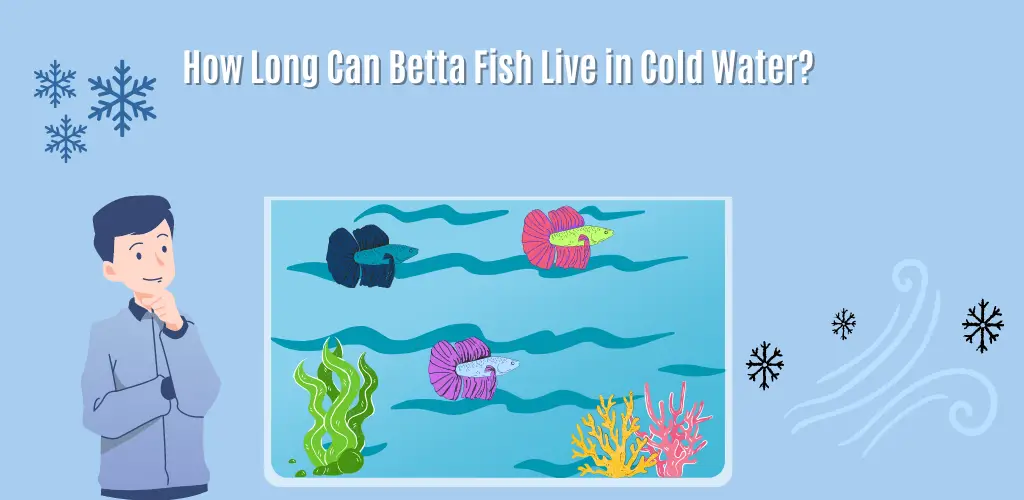Betta fish, also known as Siamese fighting fish, are vibrant and popular pets known for their striking colors and elaborate fins. However, their captivating appearance comes with specific care requirements, particularly regarding water temperature. Understanding the importance of this question of how long can betta fish live in cold water and its effects is crucial for providing them with the right care and ensuring their longevity and well-being.
Betta Fish Habitat and Ideal Water Conditions
In their natural habitat, betta fish thrive in shallow, warm waters, such as the rice paddies, canals, and floodplains of Southeast Asia. These environments typically maintain temperatures ranging from 75 to 82 degrees Fahrenheit (24 to 28 degrees Celsius). Betta fish are tropical species and require stable, warm temperatures to stay healthy and active. Mimicking these conditions in a home aquarium is essential to ensure their well-being.
Betta Fish and Temperature Tolerance
Betta fish have a limited tolerance for temperature fluctuations. Sudden changes in water temperature can cause significant stress, leading to health issues. While they can tolerate slightly cooler temperatures for short periods, prolonged exposure to cold water can be harmful. A betta’s tolerance for cold water is minimal, and it is not advisable to expose them to temperatures below their ideal range for extended periods.
How Cold Water Affects Betta Fish
When betta fish are exposed to cold water below 65 degrees Fahrenheit (18 degrees Celsius), their metabolism slows down significantly. This reduction in metabolic rate causes them to become lazy and less active. The sluggish behavior can weaken their immune system, making them more susceptible to diseases and shortening their lifespan. Prolonged exposure to cold water can lead to severe health issues and even death.
Signs of Stress or Illness in Betta Fish
Recognizing the signs of stress or illness due to cold water exposure is essential for timely intervention. Some common indicators include:
- Reduced activity and sluggishness: Betta fish may become less responsive and move slowly.
- Loss of appetite: A decrease in feeding behavior is a clear sign of distress.
- Fading or dulling of colors: Cold water can cause bettas’ vibrant colors to fade.
- Clamped fins or fin rot: Cold temperatures can lead to clamped fins, where the fish’s fins are held close to the body, and can also contribute to fin rot.
Tips for Keeping Betta Fish Healthy in Cold Water
To ensure the well-being of your betta fish in colder conditions, consider the following tips:
- Use a reliable aquarium heater: Maintaining a stable water temperature within the recommended range is crucial. Invest in a good-quality heater to keep the water consistently warm.
- Place the aquarium in a warm area: Keep the tank away from drafts, windows, and direct sunlight to prevent temperature fluctuations.
- Monitor the water temperature regularly: Use a thermometer to check the water temperature consistently and make adjustments as needed.
- Insulate the aquarium: Consider using an aquarium cover or insulation to help retain heat, especially during colder months.
- Perform regular water changes: Clean water supports a healthy immune system. Ensure that the water added is at the correct temperature to avoid shocking your betta.
- Provide adequate hiding places: Decorations and plants can offer shelter and help bettas feel secure, reducing stress.
Additional Information
Diet and Nutrition
Proper nutrition is also vital for betta fish health. Provide a balanced diet consisting of high-quality betta pellets, frozen or live foods such as brine shrimp, daphnia, and bloodworms. A varied diet supports a robust immune system and overall well-being.
Environmental Enrichment
Betta fish are intelligent and curious creatures. Providing environmental enrichment, such as plants, hiding spots, and occasional toys or mirrors, can keep them mentally stimulated and reduce stress.
Conclusion
The question, “How long can betta fish live in cold water?” emphasizes the importance of maintaining suitable water temperatures for betta fish care. By understanding their habitat needs, recognizing signs of stress, and providing proper care, you can ensure your betta fish thrive in a healthy and comfortable environment
FAQs about Betta Fish and Cold Water
Can betta fish survive in cold water?
Betta fish can survive in slightly cooler temperatures for short periods, but prolonged exposure to cold water can harm their health and lifespan.
How can I keep my betta fish warm in cold weather?
You can keep your betta fish warm in cold weather using a reliable aquarium heater to maintain the water temperature within the recommended range.
What are the signs of stress in betta fish?
Signs of stress in betta fish include lethargy, loss of appetite, fading colors, and clamped fins.
How can I tell if my betta fish is too cold?
If your betta fish is too cold, it may become lethargic, lose its appetite, and show signs of distress. Monitoring the water temperature with a thermometer can help ensure it stays within the ideal range.
What happens if a betta fish stays in cold water for too long?
If a betta fish stays in cold water for too long, its metabolism slows down, leading to reduced activity, weakened immune system, susceptibility to diseases, and potentially shortened lifespan.
Can I use a regular household heater to warm the aquarium?
No, using a regular household heater is not recommended for warming an aquarium. Instead, use an aquarium-specific heater designed to maintain a stable temperature within the recommended range for betta fish.
Is it necessary to use a heater if my room temperature is warm?
Even if your room temperature is warm, using a heater is recommended to maintain a consistent water temperature within the ideal range for betta fish, as room temperatures can fluctuate.
Can betta fish adapt to lower temperatures over time?
While betta fish can tolerate slightly lower temperatures for short periods, they are not suited to adapt to cold water for long-term survival. Maintaining warm, stable temperatures is crucial for their health.
How often should I check the water temperature in my betta’s tank?
It’s advisable to check the water temperature daily using a reliable aquarium thermometer to ensure it stays within the ideal range for betta fish.
Can cold water cause diseases in betta fish?
Yes, cold water can weaken a betta fish’s immune system, making them more susceptible to diseases such as fin rot, ich, and other infections.
What type of heater should I use for a betta fish tank?
Use an adjustable, submersible aquarium heater suitable for the size of your tank. Ensure it has a built-in thermostat to maintain a consistent temperature within the recommended range.
Are there any natural ways to keep the tank warm without a heater?
Natural ways to keep the tank warm include placing the aquarium in a warm area of your home, away from drafts and direct sunlight, and using insulation materials like an aquarium cover. However, these methods are not as reliable as using a proper aquarium heater.
How quickly can cold water affect a betta fish?
Cold water can affect a betta fish quickly, with noticeable signs of stress and reduced activity appearing within hours of exposure. Prolonged exposure can lead to severe health issues and decreased lifespan.




